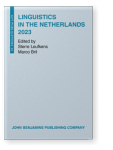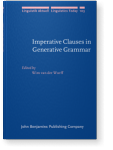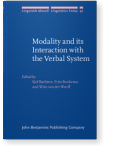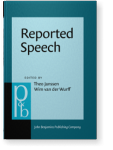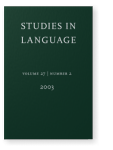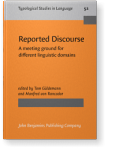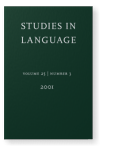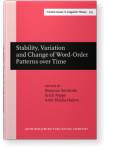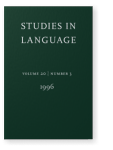Wim van der Wurff
List of John Benjamins publications for which Wim van der Wurff plays a role.
Yearbook
The Noun Phrase in English: Past and present
Edited by Alex Ho-Cheong Leung and Wim van der Wurff
[Linguistik Aktuell/Linguistics Today, 246] 2018. v, 229 pp.
Subjects English linguistics | Germanic linguistics | Syntax | Theoretical linguistics
Imperative Clauses in Generative Grammar: Studies in honour of Frits Beukema
Edited by Wim van der Wurff
[Linguistik Aktuell/Linguistics Today, 103] 2007. viii, 352 pp.
Subjects Generative linguistics | Syntax | Theoretical linguistics
Modality and its Interaction with the Verbal System
Edited by Sjef Barbiers, Frits Beukema and Wim van der Wurff
[Linguistik Aktuell/Linguistics Today, 47] 2002. x, 290 pp.
Subjects Generative linguistics
Reported Speech: Forms and functions of the verb
Edited by Theo Janssen and Wim van der Wurff
[Pragmatics & Beyond New Series, 43] 1996. x, 312 pp.
Subjects Discourse studies | Pragmatics
2018 Chapter 1. Introduction to the noun phrase in English: New clues to the past and the present The Noun Phrase in English: Past and present, Ho-Cheong Leung, Alex and Wim van der Wurff (eds.), pp. 1–10 | Chapter
2018 Chapter 6. Anaphoric reference in Early Modern English: The case of said and same The Noun Phrase in English: Past and present, Ho-Cheong Leung, Alex and Wim van der Wurff (eds.), pp. 143–186 | Chapter
Work on the anaphoric NPs the said + N and the same has shown that both were frequent in sixteenth-century English but declined afterwards. We address the question why this happened. After reviewing earlier work on the two constructions, we present data showing that their properties and development… read more
2007 How to say no and don’t: Negative imperatives in Romance and Germanic Imperative Clauses in Generative Grammar: Studies in honour of Frits Beukema, Wurff, Wim van der (ed.), pp. 205–249 | Article
After reviewing some earlier analyses of negative imperatives, we argue that there is a correlation between the (non-)availability of negative imperatives in a language and the merger of the anaphoric negator ( no ) and sentence negator ( not ). This shows up not only as lexical identity of these… read more
2007 Imperative clauses in generative grammar: An introduction Imperative Clauses in Generative Grammar: Studies in honour of Frits Beukema, Wurff, Wim van der (ed.), pp. 1–94 | Article
2002 Modals, objects and negation in late Middle English Modality and its Interaction with the Verbal System, Barbiers, Sjef, Frits Beukema and Wim van der Wurff (eds.), pp. 75–102 | Article
2002 16. A comprehensive bibliography of reported discourse Reported Discourse: A meeting ground for different linguistic domains, Güldemann, Tom and Manfred von Roncador (eds.), pp. 363–415 | Chapter
2002 6. Direct, indirect and other discourse in Bengali newspapers Reported Discourse: A meeting ground for different linguistic domains, Güldemann, Tom and Manfred von Roncador (eds.), pp. 121–139 | Chapter
2000 Two Word Order Patterns in the History of English: Stability, Variation, and Change Stability, Variation and Change of Word-Order Patterns over Time, Sornicola, Rosanna, Erich Poppe and Ariel Shisha-Halevy (eds.), pp. 259–284 | Chapter
1999 Speech Reporting in Retold Narratives in Bengali Linguistics in the Netherlands 1999, Bezooijen, Renée van and René Kager (eds.), pp. 189–201 | Article
1996 Introductory remarks on reported speech and thought Reported Speech: Forms and functions of the verb, Janssen, Theo and Wim van der Wurff (eds.), pp. 1–14 | Article
1996 Review of McMahon (1994): Understanding language change Studies in Language 20:3, pp. 680–686 | Review
1996 Sequence of tenses in English and Bengali Reported Speech: Forms and functions of the verb, Janssen, Theo and Wim van der Wurff (eds.), pp. 261–288 | Article
1993 Gerunds and their objects in the Modern English period Historical Linguistics 1991: Papers from the 10th International Conference on Historical Linguistics, Amsterdam, August 12–16, 1991, Marle, Jaap van (ed.), pp. 363–376 | Article
1992 Syntactic Variability, Borrowing, and Innovation Diachronica 9:1, pp. 61–85 | Article
SUMMARY This paper aims to show how structural and social factors can interact to bring about syntactic change. The interaction is exemplified by the case of an innovation in the easy construction which is first found in late Middle English texts. The reason for this innovation was a reanalysis of… read more
1990 The easy-to-please construction in Old and middle English Papers from the 5th International Conference on English Historical Linguistics, Adamson, Sylvia M., Vivien A. Law, Nigel Vincent and Susan Wright (eds.), pp. 519–536 | Article
